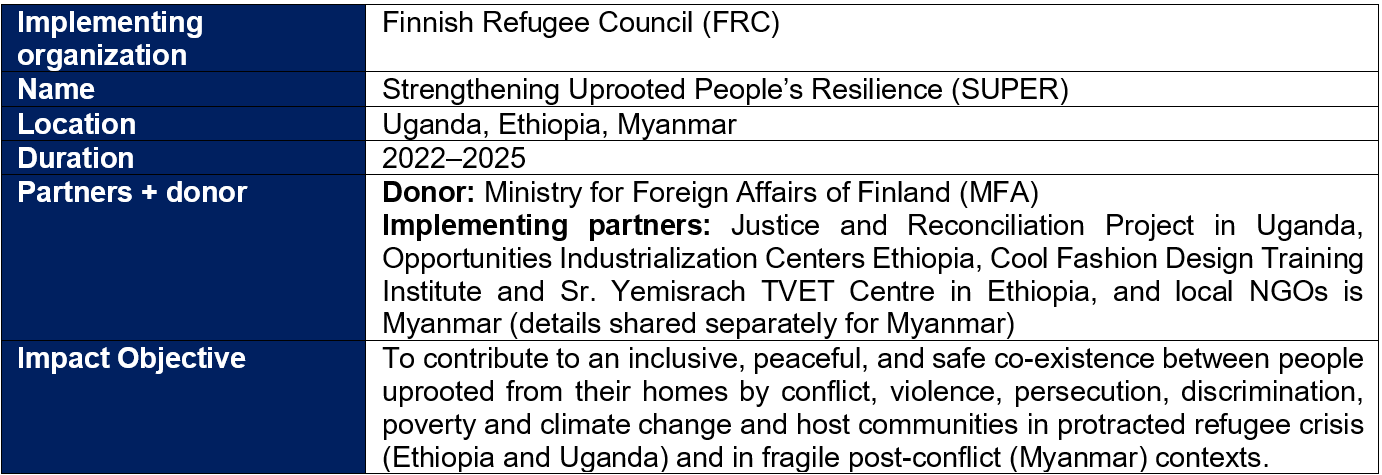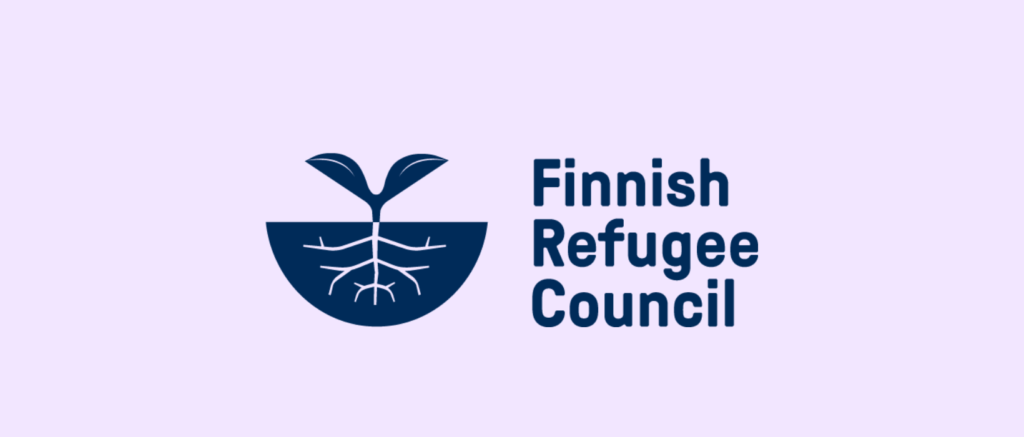Background
The Finnish Refugee Council (FRC) is an international non-governmental organization with no political or religious affiliations. For nearly 60 years FRC has been securing the rights of refugees and supports the new beginnings and resilience of the forcibly displaced and conflict-affected communities in different countries. FRC works to strengthen the resilience of refugees and conflict affected persons through vocational, livelihood, literacy, numeracy and life skills training provision and the enhancement of inter and intra communal peace building. FRC’s international programme is operated through its three Country Offices with urban and rural refugees and host communities in Uganda, with urban and rural refugees, internally displaced persons, and rural and urban host community members in Ethiopia, and with internally displaced persons, returnees, resettled persons, and host communities in Myanmar.
Finnish Refugee Council is currently implementing a Ministry for Foreign Affairs of Finland funded four-year (2022–2025) programme in Uganda, Ethiopia and Myanmar focusing on the inclusive, peaceful, and safe coexistence between uprooted people (both refugees, and internally displaced persons) and host communities (see below the programme summary). The “Strengthening Uprooted People’s Resilience” (SUPER) programme targets to reach approximately 80 000 persons directly through three immediate outcome areas:
- Immediate Outcome 1: Learners from target groups improved their capacity and skills by actively participating to diverse courses on functional adult literacy, small business management and financial literacy, language (other than mother tongue) and life skills.
- Immediate Outcome 2: Economic opportunities for target groups expanded.
- Immediate Outcome 3: Target groups and individuals supported to peacefully resolve inter- and intra-community conflicts.
Programme summary

Purpose of the evaluation
FRC is looking to conduct an external evaluation focusing on the livelihood and vocational training components of the SUPER programme (Immediate Outcome 2). Livelihood and vocational skills training components are new additions to FRC implementation specifically in Myanmar and Ethiopia, while activities have been implemented in Uganda since 1997 but with relatively few rightsholders. Because of this an evaluation would be required to provide information on the relevance of the implementation modalities and content, as well as on the impact of the conducted activities for the rightsholders. The relevance and impact of the livelihoods work should be analyzed also from the perspective of gender equality and reduction of inequalities (including persons with disabilities) as well as environmental sustainability as the cross-cutting objectives of the SUPER programme. The findings of the evaluation will be used in developing the FRC livelihood strategy, developing livelihood project/programme proposals as well as in the end of the programme report on the SUPER programme.
Evaluation context
The SUPER programme is implemented in Ethiopia, Myanmar and Uganda in refugee/IDP areas and in host communities, mostly in rural areas. All implementation locations are sensitive to conflicts ranging from ethnic and refugee/host community disputes to armed violence between different national and governmental and de facto authority groups. Implementation locations in Uganda and Ethiopia have during the SUPER programme implementation witnessed severe cuts to the food aid provided to refugees which has impacted the SUPER programme implementation in many ways. The civil war and related challenges have in particular affected the programme implementation in Myanmar where new implementation strategies have been developed throughout the programme to respond to the increasing security issues and economic and business challenges. The conflicts in Ethiopia and Myanmar have also temporarily affected FRC access to implementation sites for timely implementation and in-person monitoring during the programme implementation. The conflict in Myanmar has led to a severe disturbtion of the labor market. Further, due to the ongoing conflicts and challenges with access to food, as well as different national policies related to the rights of the refugees, many of the programme participants across the countires are prone to active movement within and between countries which present some challenges both for activity implementation and for post-implementation monitoring.
Scope of the evaluation
The evaluation will focus on FRC’s livelihood and vocational skills activities implemented under the SUPER programme (immediate Outcome 2) in Ethiopia, Myanmar, and Uganda as well as the related life skills trainings (immediate Outcome 1) provided in Myanmar between 2022 and 2024. The evaluation is estimated to take place between August and November 2024. Because of the wide geographic range of the implementing locations as well as the risks of violent conflicts especially in Myanmar, the data under this evaluation will primarily be collected remotely, with a possibility of a field trip to Uganda/Ethiopia. This is however also dependent on the current posting of the chosen evaluator/s and the proposed methodologies.
Evaluation criteria
The evaluation will be a combination of a summative and process evaluation looking at the impact of the livelihoods and vocational and life skills trainings, and the Village Saving and Loans Association work on the resilience of the target group and the relevance of the training content and work modalities for the expansion of the economic opportunities and the resilience of the target groups, in particular displaced persons with disabilities and women.
Evaluation questions
The evaluation will respond to the following questions:
- What in the vocational, livelihoods and life skills programme plans, and implementation has been relevant to expanding the economic opportunities and resilience of the target groups, including persons with disabilities and women?
- What aspects of the vocational, livelihoods and life skills implementation should be changed or revised to be more relevant for expanding the target groups’ (including persons with disabilities and women) economic opportunities and resilience?
- What has the impact of the vocational, livelihoods and life skills implementation been on the target group, and displaced persons with disabilities and women in particular?
- How efficient has the FRC vocational, livelihoods and life skills work been?
- Regarding the approach of working with partners, what have been the benefits of cooperation for the partners as well as for FRC. What are the lessons learnt and best practices.
Methodology
The evaluation is recommended to use at least the following methodologies for data collection:
- Desk study of relevant programme documents. Available documents include monthly, quarterly, and annual reports from each country implementation as well as annual programme reports, implementation plans, and annual country level self-assessments.
- Interviews with key stakeholders including programme and partner staff, right-holders (learners) and community leaders, representatives of local organizations of women and persons with disabilities, trainers and representatives of local businesses using participatory methods as much as possible.
- Survey with right-holders.
For the interviews and surveys the evaluation will use purposeful sampling due to the mobility of the target group (aiming at approximately 10–20 % sample size but depending on the final methodology). The evaluation should have a representative take from years 2022, 2023 and 2024. The evaluation should have a specific focus on the impact and relevance of the project on persons with disabilities and women, and this should also be considered in the data collection methodology, namely time and modalities of data collection, and data sources.
Work Plan

The evaluator/s work will be supervised by the FRC evaluation steering committee consisting of the FRC Helsinki MEAL specialist (day to day lead), Director of the international programme and Programme managers at country offices with support from livelihoods/vocational technical specialists when needed.
Criteria for evaluator/s
The evaluation can be conducted either by a sole evaluator or a consortium of evaluators. The selected evaluators should have:
- An advanced university degree or equivalent training on relevant disciplines;
- Demonstrated experience from designing, managing and conducting evaluations and other assessments in crises affected contexts, including with IDPs/refugees. Experience from target countries preferable.
- Demonstrated experience from designing, managing and conducting evaluations and other assessments on the topics relevant for this evaluation scope (livelihoods and vocational training);
- Demonstrated experience in applying gender perspective and human-rights based approach to evaluations;
- Fluency in written and spoken English;
- Demonstrated experience from using KOBO and different qualitative and quantitiave data collection and analysis tools;
- Demonstrated ability to manage and coordinate work.
and preferably experience and training on disability inclusion and gender equality and on participatory data collection methods.
Application process
Interested parties should submit:
- CVs and maximum two references
- An comprehensive evaluation plan with suggested methodology, timeline and budget
by 22.3.2024 via email to recruitment@refugeecouncil.fi; with reference SUPER evaluation
All shortlisted candidates will be informed via email by 29.3.2024.
Contact Information
For any inquiries or questions related to this assignment, please contact leena.kumpulainen@refugeecouncil.fi



